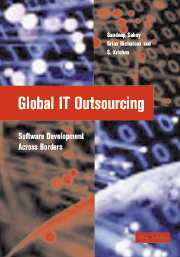Book contents
- Frontmatter
- Contents
- List of figures
- List of tables
- List of boxes
- Foreword
- Acknowledgements
- List of abbreviations
- 1 Introducing the phenomenon of global software work
- 2 Globalization and global software work
- 3 GlobTel's GSA programme in India
- 4 The GlobTel–Witech relationship: a ‘standardization’ perspective
- 5 Global software work: an identity perspective
- 6 The GlobTel–MCI relationship: the dialectics of space and place
- 7 Managing the knowledge transfer process: the case of Sierra and its Indian subsidiary
- 8 The case of Gowing and Eron GSA: power and control
- 9 Cross-cultural communication challenges: GSAs between Japanese and Indian firms
- 10 Reflections and synthesis on theoretical insights
- 11 Managerial implications
- Index
- References
6 - The GlobTel–MCI relationship: the dialectics of space and place
Published online by Cambridge University Press: 14 January 2010
- Frontmatter
- Contents
- List of figures
- List of tables
- List of boxes
- Foreword
- Acknowledgements
- List of abbreviations
- 1 Introducing the phenomenon of global software work
- 2 Globalization and global software work
- 3 GlobTel's GSA programme in India
- 4 The GlobTel–Witech relationship: a ‘standardization’ perspective
- 5 Global software work: an identity perspective
- 6 The GlobTel–MCI relationship: the dialectics of space and place
- 7 Managing the knowledge transfer process: the case of Sierra and its Indian subsidiary
- 8 The case of Gowing and Eron GSA: power and control
- 9 Cross-cultural communication challenges: GSAs between Japanese and Indian firms
- 10 Reflections and synthesis on theoretical insights
- 11 Managerial implications
- Index
- References
Summary
The significance of space and place
Many contemporary writers have emphasized the fundamental role of the space–place distinction in contemporary life and globalization. For example, Giddens (1990) writes that in traditional societies, space and place largely coincided since social interactions occurred under conditions of ‘presence’. In contemporary society, with increasing interactions between ‘absent’ others, space is separated from place, and activities are coordinated without necessary reference to the particularities of place. The experience of the ‘here’ and ‘now’ is tied to and contingent on actors and actions at a distance. Such discussions have helped to refocus the political role on the ‘local’ and to emphasize the tensions that arise in the interplay between the local and the global.
Space and place serve as powerful metaphors to understand the global and the local, respectively, and the tensions that arise when social practices play out simultaneously in the global and the local. Schultze and Boland (2000) describe place in terms of its association with the sense of boundedness, localness and particularity, as contrasted to space and its sense of universal, generalizable and the abstract. The distinction between place and space can be conceptualized with respect to the meanings that people ascribe to locations – physical or imagined. Spaces serve as containers or receptacles for places whose meanings are shaped by what one does in them.
- Type
- Chapter
- Information
- Global IT OutsourcingSoftware Development across Borders, pp. 112 - 131Publisher: Cambridge University PressPrint publication year: 2003



